
How to use Equoral
Leaflet attached to the packaging: patient information
Warning! The leaflet should be kept. Information on the immediate packaging in a foreign language
Equoral (Ciclosporin Teva)
100 mg/ml, oral solution
Ciclosporinum
Equoral and Ciclosporina Teva are different trade names for the same medicine.
You should carefully read the contents of the leaflet before taking the medicine, as it contains important information for the patient.
- You should keep this leaflet so that you can read it again if you need to.
- If you have any doubts, you should consult a doctor, pharmacist, or nurse.
- This medicine has been prescribed to a specific person. It should not be given to others.
- The medicine may harm another person, even if the symptoms of their illness are the same.
- If the patient experiences any side effects, including any side effects not listed in this leaflet, they should tell their doctor, pharmacist, or nurse. See section 4.
Table of contents of the leaflet:
- 1. What is Equoral and what is it used for
- 2. Important information before taking Equoral
- 3. How to take Equoral
- 4. Possible side effects
- 5. How to store Equoral
- 6. Contents of the packaging and other information
1. What is Equoral and what is it used for
What is Equoral
This medicine is called Equoral. It contains the active substance cyclosporin. This medicine belongs to a group of medicines called immunosuppressants. These medicines are used to reduce the body's immune response.
What is Equoral used for and how does it work
- In patients after organ, bone marrow, or stem cell transplantation, Equoral works by controlling the immune system. Equoral prevents the rejection of the transplanted organ by blocking the development of certain cells that would normally attack the transplanted tissue.
- In patients with autoimmune diseases, in which the immune system attacks the body's own cells, Equoral stops this immune response. These diseases include eye diseases that threaten vision loss (endogenous uveitis, including Behçet's disease), severe cases of certain skin diseases (atopic dermatitis or eczema and psoriasis), severe rheumatoid arthritis, and a kidney disease called nephrotic syndrome.
2. Important information before taking Equoral
In patients taking Equoral after transplantation, this medicine will be prescribed only by a doctor with experience in transplantation and/or autoimmune diseases. The instructions in this leaflet may be different, depending on whether the patient is taking this medicine due to organ transplantation or autoimmune disease treatment. You should carefully follow all the doctor's instructions. They may differ from the general information contained in this leaflet.
When not to take Equoral
- if the patient is allergic to cyclosporin or any of the other ingredients of the medicine (listed in section 6);
- with medicines containing Hypericum perforatum(St. John's Wort).
- with medicines containing dabigatran etexilate(used to prevent blood clots after surgery) or bozentanand aliskiren(used to lower blood pressure).
You should not take Equoral and should tell your doctorif such a situation applies to you. If in doubt, you should consult a doctor before taking Equoral.
Warnings and precautions
Before and during treatment with Equoral, you should immediately tell your doctor if:
- you have any signs of infection, such as fever or sore throat. Equoral suppresses the immune system and may also affect the body's ability to fight infections;
- you have liver disease;
- you have kidney disease. Your doctor will order regular blood tests and may change the dose of the medicine if necessary;
- you have high blood pressure. Your doctor will regularly check your blood pressure and may prescribe a medicine to lower it if necessary;
- you have a magnesium deficiency. Your doctor may recommend that you take magnesium supplements, especially immediately after surgery if you have received a transplant;
- you have a high level of potassium in the blood;
- you have gout;
- you need to be vaccinated. If any of these situations occur before or during treatment with Equoral, you should immediately tell your doctor.
Protection from sunlight and sun exposure
Equoral suppresses the immune system, which increases the risk of developing malignant tumors, especially skin and lymphatic system tumors. You should limit exposure to sunlight and UV radiation by:
- wearing protective clothing;
- frequently using sunscreens with a high protection factor.
You should talk to your doctor before taking Equoral if:
- you have problems with alcohol, currently or in the past;
- you have epilepsy;
- you have any liver disease;
- you are pregnant;
- you are breastfeeding;
- this medicine has been prescribed for a child. If any of these situations apply to you (or you are not sure), you should tell your doctor before taking Equoral. This is because the medicine contains alcohol (see also below "Equoral contains ethanol").
Control tests during Equoral treatment
Your doctor will monitor the following parameters:
- cyclosporin levels in the blood, especially in patients after transplantation;
- blood pressurebefore starting treatment and regularly during treatment;
- liver and kidney function;
- lipid levels in the blood. If you have any questions about how Equoral works or why it has been prescribed for you, you should ask your doctor.
In addition, patients taking Equoral for indications other than post-transplantation
(intermediate or posterior uveitis and Behçet's disease, atopic dermatitis, severe rheumatoid arthritis, or nephrotic syndrome), should not take Equoral if:
- they have kidney disease (except for nephrotic syndrome);
- they have uncontrollable infections;
- they have any malignant tumors;
- they have uncontrolled high blood pressure. If high blood pressure occurs during treatment and cannot be controlled with medication, the doctor should stop Equoral treatment. You should not take Equoral if any of these situations apply to you. If in doubt, you should consult a doctor or pharmacist before taking Equoral.
In patients being treated for Behçet's disease, the doctor will closely monitor the patient's condition if they experience neurological symptoms (e.g., increased forgetfulness, personality changes during treatment, psychiatric disorders, or mood changes, burning sensation in the limbs, decreased sensation in the limbs, tingling sensation in the limbs, weakness in the limbs, gait disturbances, headache with nausea and vomiting, or without, vision disturbances, including limited mobility of the eyeballs). The doctor will closely monitor treatment in elderly patients and those being treated for psoriasis or atopic dermatitis. If Equoral has been prescribed for the treatment of psoriasis or atopic dermatitis, the patient should not expose themselves to UVB radiation or undergo phototherapy during treatment. You should inform your doctor if you have hepatitis C. During treatment for hepatitis C, liver function may change, which may affect cyclosporin levels in the blood. Close monitoring by the doctor of cyclosporin levels in the blood and dose adjustment after starting hepatitis C treatment may be necessary.
Children and adolescents
Equoral should not be given to children for the treatment of post-transplantation diseases, except for nephrotic syndrome.
Elderly patients (65 years and older)
Experience with the use of Equoral in elderly patients is limited. In these patients, the doctor should monitor kidney function. Patients over 65 years old with psoriasis or atopic dermatitis should only be treated with Equoral if their disease is particularly severe.
Equoral and other medicines
You should tell your doctor or pharmacist about all medicines you are taking, have recently taken, or plan to take. In particular, you should tell your doctor or pharmacist if you are taking any of the following medicines before or during treatment with Equoral:
- Medicines that may affect potassium levels. These include medicines containing potassium, potassium supplements, diuretics (diuretics that spare potassium), and some blood pressure-lowering medicines.
- Methotrexate. It is used to treat tumors, severe psoriasis, and severe rheumatoid arthritis.
- Medicines that may increase or decrease cyclosporin (the active substance of Equoral) levels in the blood. Your doctor may recommend monitoring cyclosporin levels in the blood when starting or stopping other medicines.
- Medicines that may increase cyclosporin levels in the blood include: antibiotics (such as erythromycin or azithromycin), antifungal medicines (voriconazole, itraconazole), medicines used to treat heart diseases or high blood pressure (diltiazem, nicardipine, verapamil, amiodarone), metoclopramide (used to treat vomiting), oral contraceptives, danazol (used to treat menstrual problems), medicines used to treat gout (allopurinol), cholic acid and its derivatives (used to treat gallstones), HIV protease inhibitors, imatinib (used to treat leukemia or tumors), colchicine, telaprevir (used to treat hepatitis C).
- Medicines that may decrease cyclosporin levels in the blood include: barbiturates (used as sleeping pills), some antiepileptic medicines (such as carbamazepine or phenytoin), octreotide (used to treat acromegaly or neuroendocrine tumors), antibacterial medicines used to treat tuberculosis, orlistat (used to aid weight loss), herbal medicines containing St. John's Wort, ticlopidine (used after a stroke), certain blood pressure-lowering medicines (bosentan), and terbinafine (an antifungal medicine used to treat fungal infections of the toes and fingernails).
- Medicines that affect kidney function. These include: antibacterial medicines (gentamicin, tobramycin, ciprofloxacin), antifungal medicines containing amphotericin B, medicines used to treat urinary tract infections containing trimethoprim, anticancer medicines containing melphalan, medicines used to reduce stomach acid (proton pump inhibitors), tacrolimus, painkillers (non-steroidal anti-inflammatory medicines such as diclofenac), medicines containing fibric acid (used to reduce blood lipid levels, so-called fibrates).
- Nifedipine. It is used to treat high blood pressure and chest pain. Taking nifedipine during cyclosporin treatment may cause gum swelling and overgrowth around the teeth.
- Digoxin (used to treat heart diseases), cholesterol-lowering medicines (HMG-CoA reductase inhibitors, also known as statins), prednisolone, etoposide (used to treat cancer), repaglinide (an antidiabetic medicine), immunosuppressants (everolimus, sirolimus), ambrisentan, and specific anticancer medicines called anthracyclines (such as doxorubicin).
If any of these situations apply to you (or you are not sure), you should talk to your doctor or pharmacist before taking Equoral.
Equoral with food and drink
You should not take Equoral with grapefruit or grapefruit juice, as they may affect the way Equoral works.
Pregnancy and breastfeeding
If you are pregnant or breastfeeding, think you may be pregnant, or plan to have a baby, you should ask your doctor for advice before taking this medicine. Your doctor will discuss the risks and benefits of taking Equoral during pregnancy.
- You should tell your doctor if you are pregnant or plan to become pregnant.Experience with the use of Equoral during pregnancy is limited. Equoral should not be used during pregnancy unless necessary. If it is necessary to take this medicine, your doctor will discuss the benefits and risks of taking it during pregnancy.
- You should tell your doctor if you are breastfeeding.If you are taking Equoral, you should notbreastfeed because cyclosporin, the active substance of Equoral, passes into breast milk. This may affect the baby.
Driving and using machines
Equoral contains alcohol. This may affect your ability to drive or use machines.
Equoral contains ethanol
Equoral contains approximately 15.2% (by volume) ethanol (alcohol), which corresponds to a maximum of 600 mg per dose in post-transplant patients. This is equivalent to almost 15.2 ml of beer or 6.3 ml of wine (12%) per dose. The alcohol in this medicine may change the effect of other medicines. If you are taking other medicines, you should consult your doctor or pharmacist. If you are addicted to alcohol, you should consult your doctor or pharmacist before taking this medicine. Alcohol may be harmful to patients with alcohol dependence, epilepsy, brain damage, liver disease, or pregnant or breastfeeding women. It may also be harmful if this medicine is given to children.
Equoral contains macrogolglycerol hydroxystearate
The medicine contains macrogolglycerol hydroxystearate, which may cause gastrointestinal disorders and diarrhea.
3. How to take Equoral
This medicine should always be taken exactly as prescribed by your doctor. If you are unsure, you should consult your doctor. You should not take more of the medicine than prescribed. Your doctor will carefully adjust the dose of this medicine to your individual needs. Taking too much of the medicine may affect kidney function. You will have regular blood tests and hospital visits, especially after transplantation. This will be an opportunity to discuss your treatment and any problems you may have.
How much Equoral to take
Your doctor will adjust the correct dose of Equoral for you. It depends on your body weight and the reason why this medicine is being used. Your doctor will also tell you how often to take it.
- In adults:
Organ, bone marrow, or stem cell transplantation
- The total daily dose usually ranges from 2 mg to 15 mg per kilogram of body weight. It is divided into two doses.
- Larger doses are usually used before and immediately after transplantation. Smaller doses are used after the transplanted organ or bone marrow has stabilized.
- Your doctor will adjust the dose of the medicine to be optimal for you. To do this, blood tests may be necessary.
Endogenous uveitis
The total daily dose usually ranges from 5 mg to 7 mg per kilogram of body weight. It is divided into two doses.
Nephrotic syndrome
The total daily dose usually is 5 mg per kilogram of body weight. It is divided into two doses. In patients with kidney disease, the first dose taken each day should not be more than 2.5 mg per kilogram of body weight.
Severe rheumatoid arthritis
The total daily dose usually ranges from 3 mg to 5 mg per kilogram of body weight. It is divided into two doses.
Psoriasis and atopic dermatitis
The total daily dose usually ranges from 2.5 mg to 5 mg per kilogram of body weight. It is divided into two doses.
- In children:
Nephrotic syndrome
The total daily dose usually is 6 mg per kilogram of body weight. It is divided into two doses. In patients with kidney disease, the first dose taken each day should not be more than 2.5 mg per kilogram of body weight. You should carefully follow your doctor's instructions and never change the dose yourself, even if you feel well.
Switching from another oral cyclosporin medicine to Equoral
In patients who are already taking another oral cyclosporin medicine (soft capsules or oral solution), the doctor may decide to switch to Equoral oral solution. All these medicines contain cyclosporin as the active ingredient. Equoral is a different, improved formulation of cyclosporin. Cyclosporin is better absorbed into the blood from Equoral, and there is less likelihood that absorption will depend on food intake. This means that cyclosporin levels in the blood will remain more stable during Equoral treatment. If the doctor switches from another oral cyclosporin medicine to Equoral:
- You should not take the previous medicine again unless your doctor tells you to.
- After switching from another medicine to Equoral, your doctor will closely monitor your condition for a short time. This is due to the change in cyclosporin absorption into the blood. Your doctor will check that you are receiving the correct dose for your needs.
- You may experience some side effects. If this happens, you should tell your doctor or pharmacist. It may be necessary to reduce the dose of the medicine. You should never reduce the dose yourself unless your doctor tells you to.
If the doctor switches from one oral cyclosporin formulation to another
After switching from one oral cyclosporin formulation to another:
- Your doctor will closely monitor your condition for a short time.
- You may experience some side effects. If this happens, you should tell your doctor or pharmacist. It may be necessary to change the dose of the medicine. You should never change the dose yourself unless your doctor tells you to.
When to take Equoral
You should take Equoral every day at the same time. This is very important in patients after transplantation.
How to take Equoral
The daily dose should always be taken in 2 divided doses.
- First use, perform the actions described in points 1 to 7.
- Subsequent use, perform the actions described in points 4 to 7.
Starting a new bottle of Equoral oral solution
The dose of Equoral should be measured with the enclosed syringe and diluted with orange juice or another non-alcoholic beverage (grapefruit juice is contraindicated) in a ratio of 1:20. For dilution, glass or porcelain containers should be used. The use of plastic containers is not recommended. The prepared drink should be consumed immediately in its entirety; any remaining medicine in the container should be mixed with a small amount of the liquid used for dilution and consumed. The outer surface of the syringe should be wiped with a paper towel after use and then the syringe should be returned to its protective cover. The dosing syringe should not be washed with water, alcohol, or other liquids. The syringe is only suitable for use when it is completely dry. The instructions for using the dosing kit are as follows:
- 1. Unscrew the cap
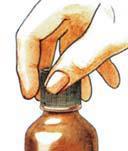
- 2. Insert the dosing adapter with a tube into the neck of the bottle, which will remain in this position for the entire duration of treatment.
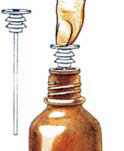
- 3. Insert the syringe into the opening of the adapter with a tube and, using the plunger, draw up the prescribed amount of medicine. If air bubbles form, they should be removed by repeating the suction and release of the medicine into the bottle, and then drawing up the prescribed amount of liquid again.
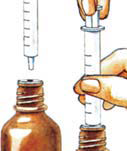
- 4. Measure the prescribed amount of medicine with the enclosed syringe and dilute it with orange juice or another non-alcoholic beverage (do not use grapefruit juice) in a ratio of 1:20. For dilution, a glass or porcelain container should be used (plastic containers are not recommended). The prepared drink should be consumed immediately in its entirety; any remaining medicine in the container should be mixed with a small amount of the liquid used for dilution and consumed.
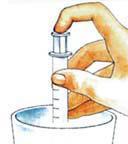
- 5. After measuring the correct amount of medicine, the bottle should be closed immediately with the cap.
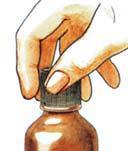
- 6. After using the syringe, the tip should be wiped with a dry paper towel and returned to the plastic tube. The syringe should never be rinsed with water, alcohol, or other liquids. The syringe is only suitable for use when it is completely dry.
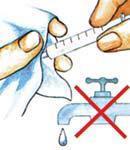
How long to take Equoral
Your doctor will tell you how long to take Equoral. It depends on whether you are taking the medicine after receiving a transplant or for the treatment of severe skin diseases, rheumatoid arthritis, uveitis, or nephrotic syndrome. In the case of severe psoriasis, treatment usually lasts 8 weeks. You should continue taking Equoral for as long as your doctor tells you. If you have any questions about how long to take Equoral, you should talk to your doctor or pharmacist.
Taking more Equoral than prescribed
If you accidentally take more of the medicine than prescribed by your doctor, you should immediately contact your doctor or go to the emergency room of the nearest hospital. You may need medical attention.
Missing a dose of Equoral
- If you forget to take a dose of the medicine, you should take it as soon as possible. However, if it is almost time for the next dose, you should skip the missed dose. Then, you should continue taking the medicine as before.
- You should not take a double dose to make up for a missed dose.
Stopping Equoral treatment
You should not stop taking Equoral unless your doctor tells you to. You should continue taking Equoral even if you feel well. Stopping Equoral treatment may increase the risk of rejecting the transplanted organ. If you have any further doubts about taking this medicine, you should consult your doctor or pharmacist.
4. Possible side effects
Like all medicines, Equoral can cause side effects, although not everybody gets them.
Some side effects may be serious
You should immediately tell your doctorif you notice any of the following serious side effects:
- Like other medicines that affect the immune system, cyclosporin may change the body's ability to fight infections and may cause the development of tumors or other malignant diseases, especially skin and lymphatic system tumors. Signs of infection may include fever or sore throat.
- Changes in vision, loss of coordination, clumsiness, memory loss, difficulty speaking or understanding what others are saying, and muscle weakness. These may be symptoms of a brain infection called progressive multifocal leukoencephalopathy.
- Brain disorders with symptoms such as seizures, confusion, disorientation, decreased responsiveness, personality changes during treatment, agitation, insomnia, changes in vision, blindness, coma, paralysis of part or all of the body, stiffness of the neck, loss of coordination with (or without) speech or eye movement disorders.
- Swelling of the back of the eye. It may be associated with blurred vision. It may also affect vision due to increased pressure in the head (non-tumor-related intracranial hypertension).
- Liver disorders with yellowing of the skin and eyes, nausea, loss of appetite, and dark urine, or without these symptoms.
- Kidney disorders that can significantly reduce the amount of urine produced.
- A small number of red blood cells or platelets. Symptoms of these disorders include pale skin, feeling tired, shortness of breath, dark urine (a sign of red blood cell breakdown), bruising or bleeding without an obvious reason, feeling confused, feeling disoriented, decreased alertness, and kidney problems.
Other side effects include:
Very common side effects:may affect more than 1 in 10 people.
- Kidney function disorders.
- High blood pressure.
- Headache.
- Uncontrolled shaking of the body.
- Excessive hair growth on the body and face.
- High levels of lipids in the blood.
Common side effects:may affect 1 to 10 people in 100.
- Seizures (convulsions).
- Liver function disorders.
- High blood sugar levels.
- Fatigue.
- Loss of appetite.
- Nausea, vomiting, abdominal pain, constipation, diarrhea.
- Excessive hair growth.
- Acne, flushing.
- Fever.
- Low white blood cell count.
- Numbness or tingling.
- Muscle pain, muscle spasms.
- Stomach ulcers.
- Gum overgrowth covering the teeth.
- High levels of uric acid and potassium in the blood, low levels of magnesium in the blood.
Uncommon side effects:may affect 1 to 10 people in 1,000.
- Brain disorders, including sudden seizures, confusion, insomnia, disorientation, vision changes, loss of consciousness, feeling of weakness in the limbs, movement disorders.
- Rash.
- General swelling.
- Weight gain.
- Low red blood cell or platelet count, which may increase the risk of bleeding.
Rare side effects:may affect 1 to 10 people in 10,000.
- Nerve disorders with numbness or tingling in the fingers of the hands and feet.
- Pancreatitis with severe pain in the upper abdomen.
- Muscle weakness, loss of muscle strength, muscle pain in the legs or hands or other muscles of the body.
- Destruction of red blood cells, including kidney disorders with symptoms such as swelling of the face, abdomen, hands, and/or feet, decreased urine output, breathing difficulties, chest pain, seizures, loss of consciousness.
- Changes in the menstrual cycle, breast enlargement in men.
Very rare side effects:may affect 1 to 10 people in 100,000.
- Swelling of the back of the eye, which may be associated with increased pressure in the head and vision changes.
Other side effects with unknown frequency:frequency cannot be estimated from the available data.
- Severe liver disorders with yellowing of the eyes or skin, or without, nausea, loss of appetite, dark urine, swelling of the face, hands, feet, and/or entire body.
- Bleeding under the skin or purple spots on the skin, sudden bleeding without an obvious reason.
- Migraine or severe headache, often with nausea or vomiting and sensitivity to light.
If you experience any side effects, including any side effects not listed in this leaflet, you should tell your doctoror pharmacist.
Additional side effects in children and adolescents
No additional side effects are expected in children and adolescents compared to adults.
Reporting side effects
If you experience any side effects, including any side effects not listed in this leaflet, you should tell your doctor, pharmacist, or nurse. Side effects can be reported directly to the Department of Drug Safety Monitoring of the Office for Registration of Medicinal Products, Medical Devices, and Biocidal Products, Jerozolimskie Avenue 181C, 02-222 Warsaw, phone: +48 (22) 49 21 301, fax: +48 (22) 49 21 309, website: https://smz.ezdrowie.gov.pl. By reporting side effects, you can help provide more information on the safety of this medicine.
5. How to store Equoral
The medicine should be stored out of sight and reach of children. It should be stored at a temperature below 25°C. The solution should not be used for more than 3 months after the bottle is first opened. At temperatures below 20°C, Equoral oral solution 100 mg/ml may become cloudy. In this case, it is recommended to warm the medicine to room temperature (25°C) to eliminate the cloudiness. Any cloudiness of the solution does not affect its efficacy and dosing. You should not use this medicine after the expiry date stated on the packaging. The expiry date refers to the last day of the specified month. Medicines should not be disposed of via wastewater or household waste. You should ask your pharmacist how to dispose of medicines that are no longer needed. This will help protect the environment.
6. Contents of the packaging and other information
What Equoral contains
- The active substanceof Equoral is cyclosporin. 1 ml of the solution contains 100 mg of cyclosporin.
- Other ingredientsof the medicine are: ethanol, polyglyceryl-3-oleate, polyglyceryl-10-oleate, macrogolglycerol hydroxystearate.
What Equoral looks like and contents of the packaging
Equoral is an oily oral solution with a color ranging from yellow to brownish-yellow. The packaging contains 50 ml of the solution in a brown glass bottle with a cap and a dosing kit consisting of a syringe and a dosing adapter with a tube, placed in a closable tube, in a cardboard box. For more detailed information, you should contact the marketing authorization holder or the parallel importer.
Marketing authorization holder in Portugal, the country of export:
Teva Pharma - Produtos Farmacêuticos, Lda. Lagoas Park, Edifício 5 A, Piso 2, 2740-245 Porto Salvo, Portugal
Manufacturer:
Teva Czech Industries s.r.o. Ostravska 29, c.p. 305, 747 70 Opava-Komarov, Czech Republic
Parallel importer:
Delfarma Sp. z o.o. ul. Św. Teresy od Dzieciątka Jezus 111, 91-222 Łódź
Repackaged by:
Delfarma Sp. z o.o. ul. Św. Teresy od Dzieciątka Jezus 111, 91-222 Łódź. Marketing authorization number in Portugal, the country of export: 4877882. Parallel import authorization number: 177/22. Date of approval of the leaflet: 20.04.2022.
[Information about the trademark]
- Country of registration
- Active substance
- Prescription requiredYes
- Marketing authorisation holder (MAH)Teva Pharma - Produtos Farmacêuticos, Lda.
- This information is for reference only and does not constitute medical advice. Always consult a licensed doctor before taking any medication. Oladoctor is not responsible for medical decisions based on this content.
- Alternatives to EquoralDosage form: Capsules, 25 mgActive substance: ciclosporinPrescription requiredDosage form: Capsules, 50 mgActive substance: ciclosporinPrescription requiredDosage form: Capsules, 100 mgActive substance: ciclosporinPrescription required
Alternatives to Equoral in other countries
The best alternatives with the same active ingredient and therapeutic effect.
Alternative to Equoral in Ukraine
Alternative to Equoral in Spain
Online doctors for Equoral
Discuss dosage, side effects, interactions, contraindications, and prescription renewal for Equoral – subject to medical assessment and local rules.






